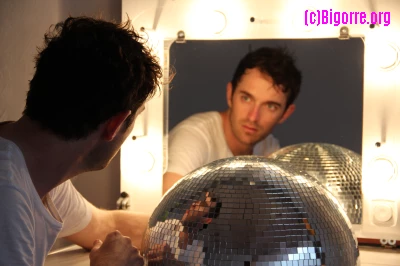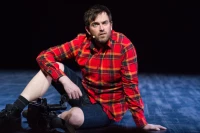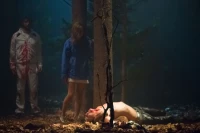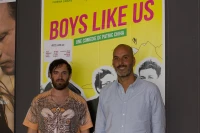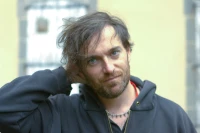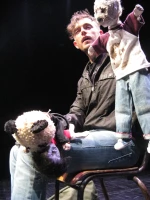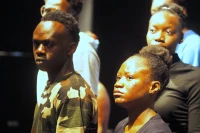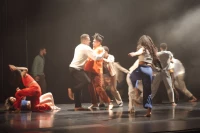Is Adishatz a return to my adolescence in Tarbes?
Yes, exactly. We started by working on French and international songs. Icons of popular music, from Cabrel to Madonna and Lady Gaga, sung a cappella to see what the lyrics have to say when you remove the music. Madonna talks to us about religion, the relationship between father and daughter. And then these discotheque songs took me back to the teenager I was when I listened to them; they took me back to my family and what I experienced here. A whole life story emerges. I also invited the Pyrenean singers. For me, they embody the strength of tradition; it's an absolute homage to the region, which is part of the music that has shaped my life in Tarbes. The show was built around all of this. It's around these scores that all the Tarbes material gradually contaminates what is written.
What is your perspective on this period?
A contrasting perspective, like adolescence. We went out, we allowed ourselves to do whatever we wanted. It was a way to let loose, to discover ourselves too. I lived in Odos. It's a village, it's already something else than Tarbes. I went to the Collège Pyrénées and the Lycée Marie Curie. I wasn't a fan of school and I wanted to escape all that, so I threw myself into the arts quite early on. I dreamed of being a pop star...
Was it necessary to leave Tarbes?
Yes. I wouldn't be where I am today if I hadn't left. Both for my artistic development and for my personal development. I quickly felt that I had seen everything Tarbes had to offer. I didn't see how I could go any further to build myself here. Being in a small town is like being in a cocoon. Leaving it is difficult! I might not have done it alone. That's where encounters are important. In this case, the one with Mercedes Tormo, who realized very quickly that I couldn't continue here, that I had to leave and discover other things.
Was coming back here with this Adishatz necessary?
Yes, I think it was necessary. I left a lot of wounds in Tarbes. Oddly enough, I always told myself that one day, I would do something with everything I experienced here. I kept all that, I nurtured it. It remained open. For me, if this Adishatz had been obvious, I would have done it sooner, I would have done it before leaving Tarbes.
Has Tarbes changed since then?
I think it's still just as complicated for teenagers. Even though the city is making efforts to liven things up, as is the Parvis. Things aren't really changing. There still aren't any gay bars here. I went to Must, which has become the R&G Room, and I danced like I do in Paris, like I've always done here. As soon as you move more than usual, you feel people staring at you, especially young people, wondering who this weird guy is. And yet, that's what clubs are for! We're not there to drink or stand around looking at other people and girls, wondering which one we could spend the rest of the evening with... At the retro club, it's simpler. Older people are more tolerant!
Arriving in Tarbes with this very personal Adishatz is more complicated than with Gisèle Vienne's Jerk, which we performed two years ago?
With Jerk, I'm playing a character who isn't close to me. There, obviously, it's more difficult: there are more tensions. I know that many people have reserved seats for the show. I don't know what they're expecting. Maybe the image of Tarbes. But it's a sublimated and offbeat reflection of what I've experienced here that I'm sending back. I've removed everything that was entertaining to go for the most sensitive, the closest. I want people to be shaken by it. I arrive with all the characters I've been able to meet, here in Tarbes. Family, friends, characters who influenced me, whom I loved, who made me sad. Some are dead, others will be in the audience. Here, the audience knows the places I evoke in the show. People may have experienced these things at the same time as me, some did it with me. It can destabilize and surprise the audience, it will destabilize me too. I'm not closed off from that, I also leave space on stage for what might appear at the time.
